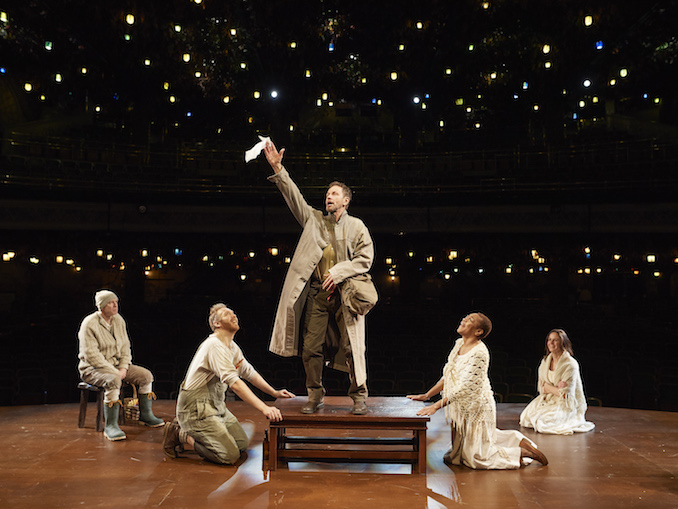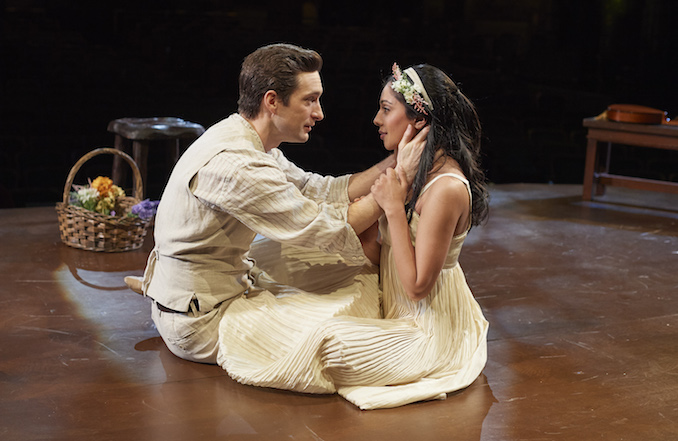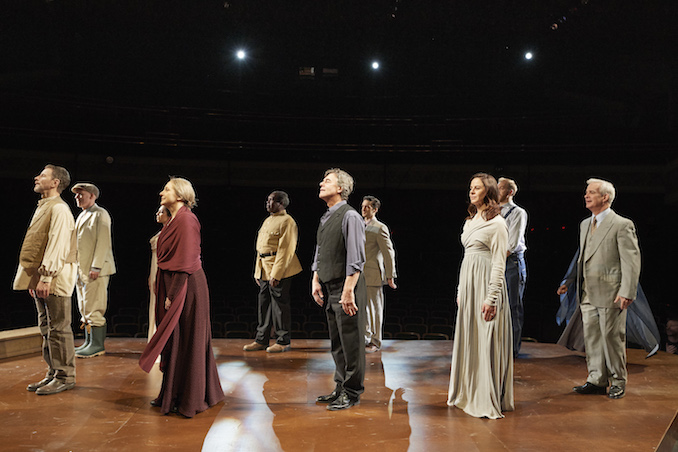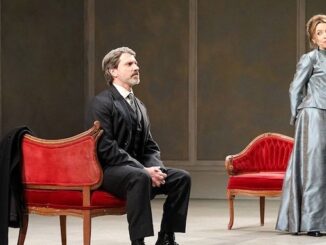With all the chaos and confusion which currently surrounds our political landscape, how appropriately fitting to bring back one of Shakespeare’s most haunting portrayals of obsession and redemption, patriarchy and tragedy. The Winter’s Tale or as some have called it, ‘The Diary of a Mad Man” debuted January 20th at the beloved Winter Garden Theatre.

The night began in a very intimate setting. With only a hand full of others, we were lead cautiously to our seats on stage, right up close with the actors with only one carpet and two chairs on set. I must admit the opening scene had thrown me for a curve ball. King Leontes sitting on an antique rocking chair watching old video clips of his wife and child from better times. The fact that he had any form of technology is one thing, but the wife and child’s very modern dress in the film was another. This was fine as modern adaptations of classic playwrights happen all the time, but then as the play commenced we were transported back to a more simpler, Shakespearean time. Odd, but the point was clear; Leontes was consumed with grief and sorrow. There was nothing he could do to rid him self of his blood stained hands and his part in the death of his beloved wife and child.
The mind is a very precarious thing and If not nourished could become ones own worst enemy. This is exactly the downfall which befell proud King Leontes.
The tragedy began shortly after the King became obsessed with the idea that his wife Hemione, was having an affair with his best friend Polixenes. Without much counsel, he ordered the death of his best friend and a trial for his wife on counts of adultery. It seems inconceivable for a man to have that much power over a women’s fate, yet alas this was almost common place at the turn of the 16th century. With only a snap of his fingers the king, and many other men, had the power to dispose of their wives if they displeased them or caused them dishonour. Leontes, played by Tom McCamus who is a member of both the Shaw and Stratford Festivals, was able to invoke the kings splintered mind and fall into obsession swiftly with his erratic movements and wild eyes.

As the plot thickens we understand why The Winter’s Tale has to be performed with the audience on stage. The intensity of the emotion was spine tingling at times. As soon as Hemoine was accused of adultery the look of disbelief and helplessness must had been felt by every women in the room, especially since she was expecting. Played by the incredibly talented Michelle Giroux, the poise and strength in her disposition which she carried with her after the disheartening orders, made us realize that one can take away everything except integrity. In the face of adversity, Giroux held her own exceptionally well.
Nevertheless, The Winter’s Tale is not all tyranny and heartache as there were some great intermissions of comic relief. Actors Gaoler and his sheep herder father are the light heartedness of the whole performance. They were enough to make us remember it wasn’t all royal courts and 3-symbol phrases in Shakespeare time, but there was also simple men with even simpler minds. Last, but certainly not least the one surprisingly stand out performer was Paulina, performed by Lucy Peacock, who played the most trusted doctor and advisor to the king and queen. Peacock’s portrayal of emotional strength and courage was unwavering till the end. Her conviction to fight for the Queen was unparalleled by even the queen herself. The audience felt her despair and frustration placed toward the king, as her passion and emotion shook the audience to its core.

Peacock’s portrayal of emotion was so true to life that it almost seemed that her intensity and indignation came from a place of truth, something she personally resonated with as she fought for the injustice of Hemoine and what seemed, the overall lack of respect and dignity toward women as well. Simply put, her anger felt like a sign of the times, a mirror reflecting our current cultural climate and the battle women still have to fight 400 years later to demand justice, freedom and what I believe is the most important of all, equality.
Raw, candid and emotionally charged, The Winter’s Tale is a must see for any adoring theatre goer who is a purist at heart and still believes that the intentions of a play is to stir and touch an nostalgic undercurrent inside us all.
***
The Winters Tale | January 20th – February 19th, 2017 | Winter Garden Theatre




